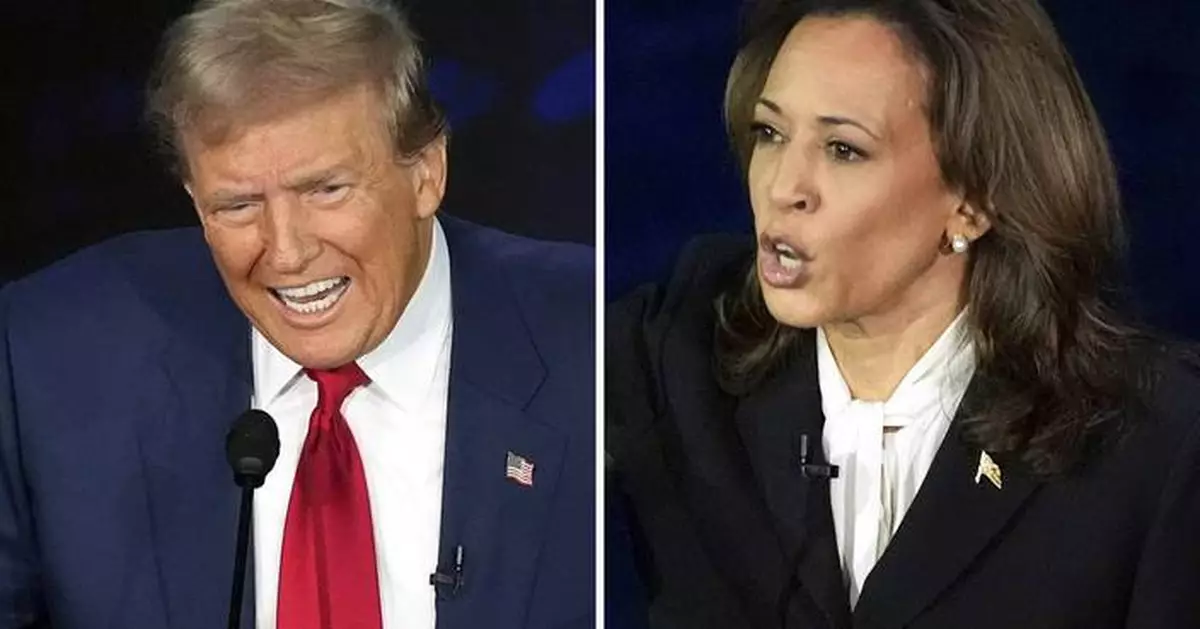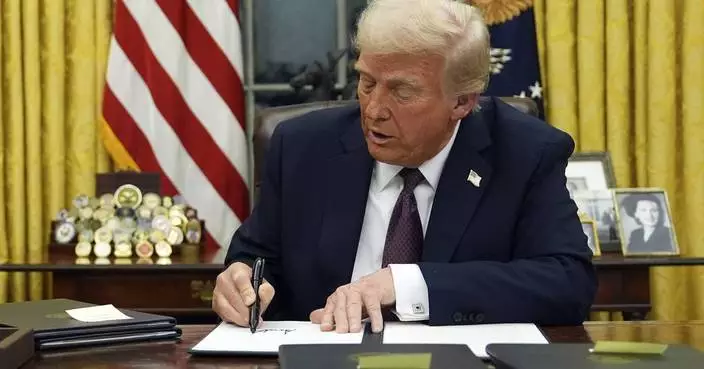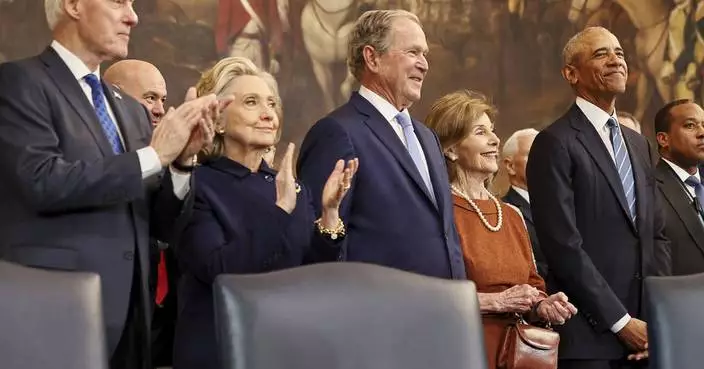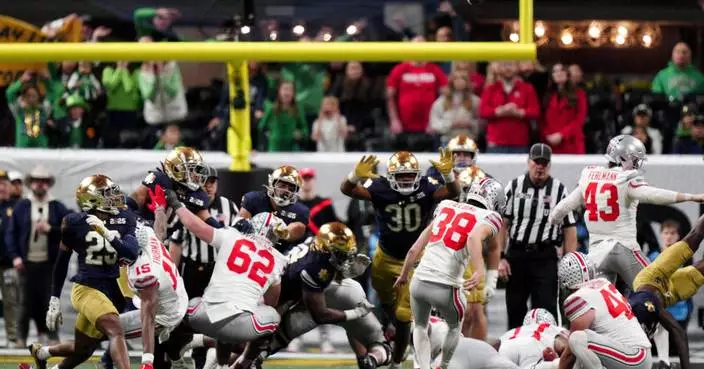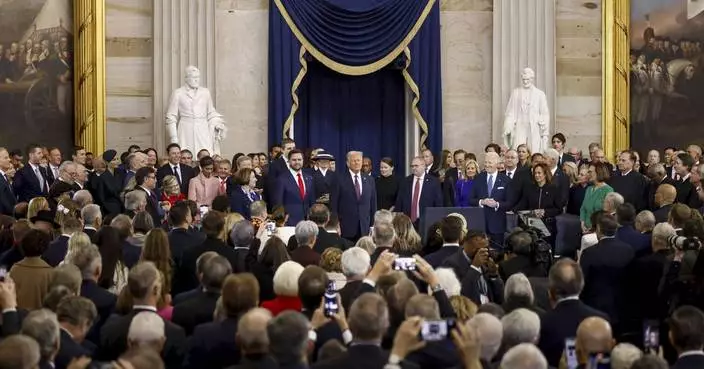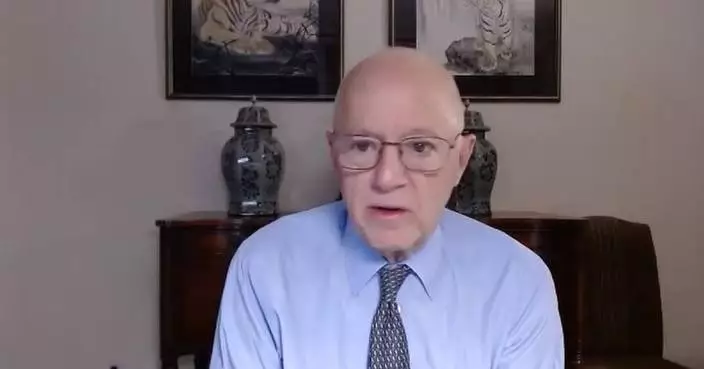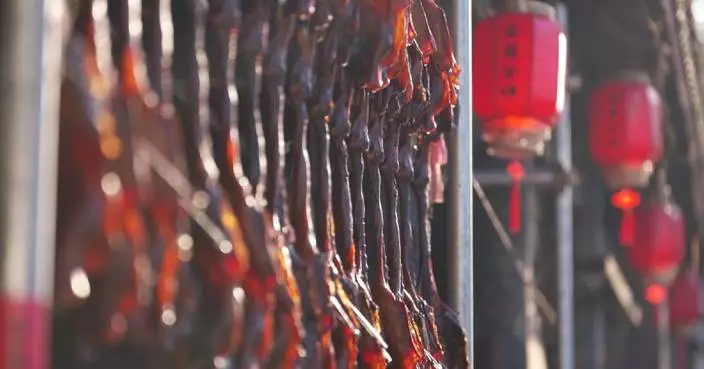ATLANTIC CITY, N.J. (AP) — People began betting Thursday on which political party would win control of Congress in the November elections after a judge's ruling allowing the wagers — the only ones to be legally approved by a U.S. jurisdiction.
New York startup company Kalshi began taking what amounts to bets on the outcome of the November congressional elections after a judge refused to block them from doing so.
The ruling by U.S. District Court Judge Jia Cobb in Washington enabled the company, at least temporarily, to offer prediction contracts across the country— essentially yes-or-no bets — on which party will win control of the Senate and the House in November.
“The Kalshi community just made history, and I know we are only getting started,” said Tarek Mansour, a co-founder of the company. “Now is finally the time to allow these markets to show the world just how powerful they are at providing signal amidst the noise, and giving us more truth about what the future holds.”
But the activity could prove short-lived. The Commodity Futures Trading Commission, an independent federal body which last year prohibited the company from offering such bets, said it would appeal the ruling as quickly as possible, citing the possibility of people trying to manipulate the election for financial purposes.
Kalshi did not say whether it intends to offer bets beyond the ones posted Thursday for congressional races, including potentially taking bets on the presidential race.
It also was not immediately clear whether sports books or online casinos would seek to offer similar political bets in light of the ruling.
Prices on Kalshi's so-called predictive contracts varied throughout the early afternoon. As of mid-afternoon, a bet on the Republicans to win control of the Senate was priced at 76 cents; a $100 bet would pay $129. A bet on the Democrats to win control of the House was priced at 63 cents, with a $100 bet paying out $154.
Better Markets, a nonprofit organization that says it advocates for the public interest in financial markets, called the development “a dangerous move that opens the floodgates to unprecedented gambling on U.S. elections, eroding public trust in both markets and democracy.”
Contrasting his client with foreign companies who take bets from American customers on U.S. elections without U.S. government approval, Roth said Kalshi is trying to do things the right way, under government regulation.
“It invested significantly in these markets,” he said during Thursday's hearing. “They spent millions of dollars. It would be perverse if all that investment went up in smoke.”
But Raagnee Beri, an attorney for the commission, said allowing such bets could invite malicious activities designed to influence the outcome of elections and undermine already fragile public confidence in the voting process.
“These contracts would give market participants a $100 million incentive to influence the market on the election,” she said. “There is a very severe public interest threat.”
She used the analogy of someone who has taken an investment position in corn commodities.
“Somebody puts out misinformation about a drought, that a drought is coming,” she said. “That could move the market on the price of corn. The same thing could happen here. The commission is not required to suffer the flood before building a dam."
Thursday's ruling will not be the last word on the case. The commission said it will appeal on an emergency basis to a Washington D.C. circuit court, and asked the judge to stay her ruling for 24 hours. But the judge declined, leaving no prohibition in place on the company offering election bets, at least in the very near term.
The company already offers yes-no positions on political topics including whether a government shutdown will happen this year, whether a new Supreme Court justice will be confirmed this year, and whether President Joe Biden's approval rating will be above or below a certain level by the end of the year.
The Kalshi bets are technically not the first to be offered legally on U.S. elections. West Virginia permitted such bets for one hour in April 2020 before reversing itself and canceling those betting markets, deciding it had not done the proper research beforehand.
Follow Wayne Parry on X at www.twitter.com/WayneParryAC
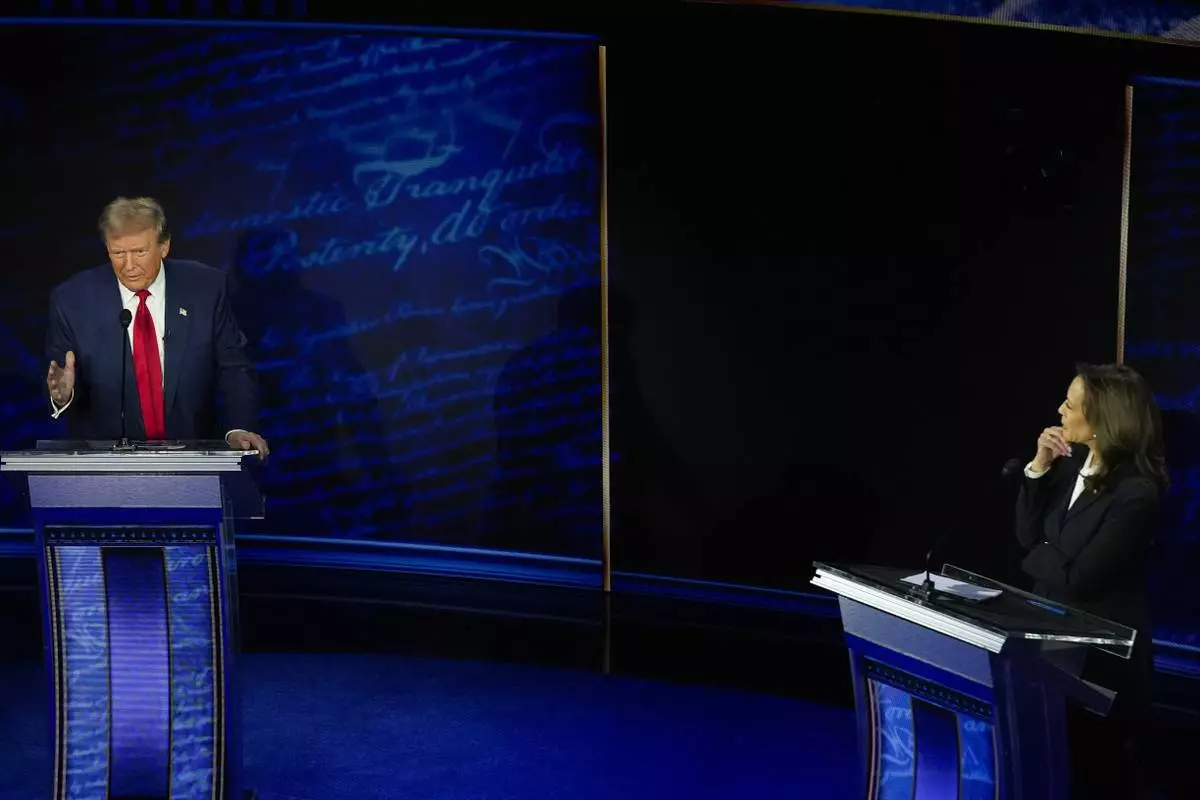
Republican presidential nominee former President Donald Trump and Democratic presidential nominee Vice President Kamala Harris participate during an ABC News presidential debate at the National Constitution Center, Tuesday, Sept. 10, 2024, in Philadelphia. (AP Photo/Alex Brandon)
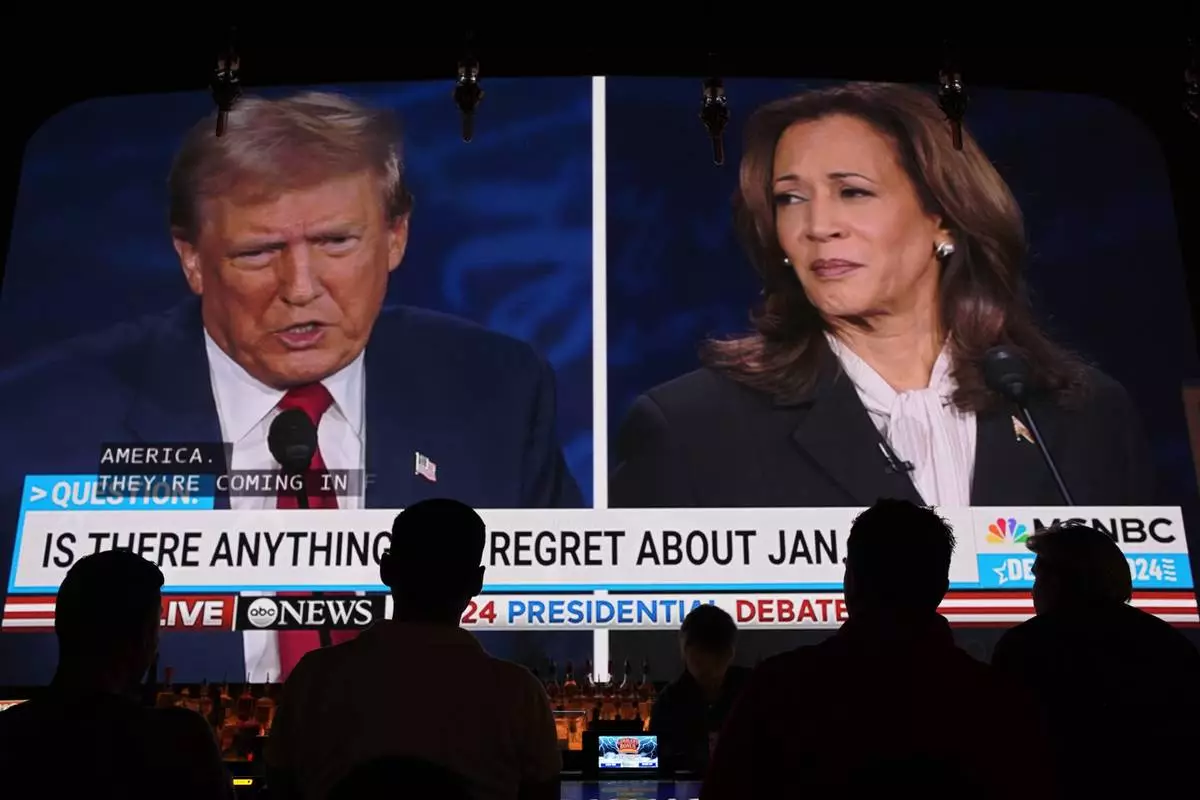
People watch the presidential debate between Republican presidential nominee former President Donald Trump and Democratic presidential nominee Vice President Kamala Harris, Tuesday, Sept. 10, 2024, at the Gipsy Las Vegas in Las Vegas. (AP Photo/John Locher)
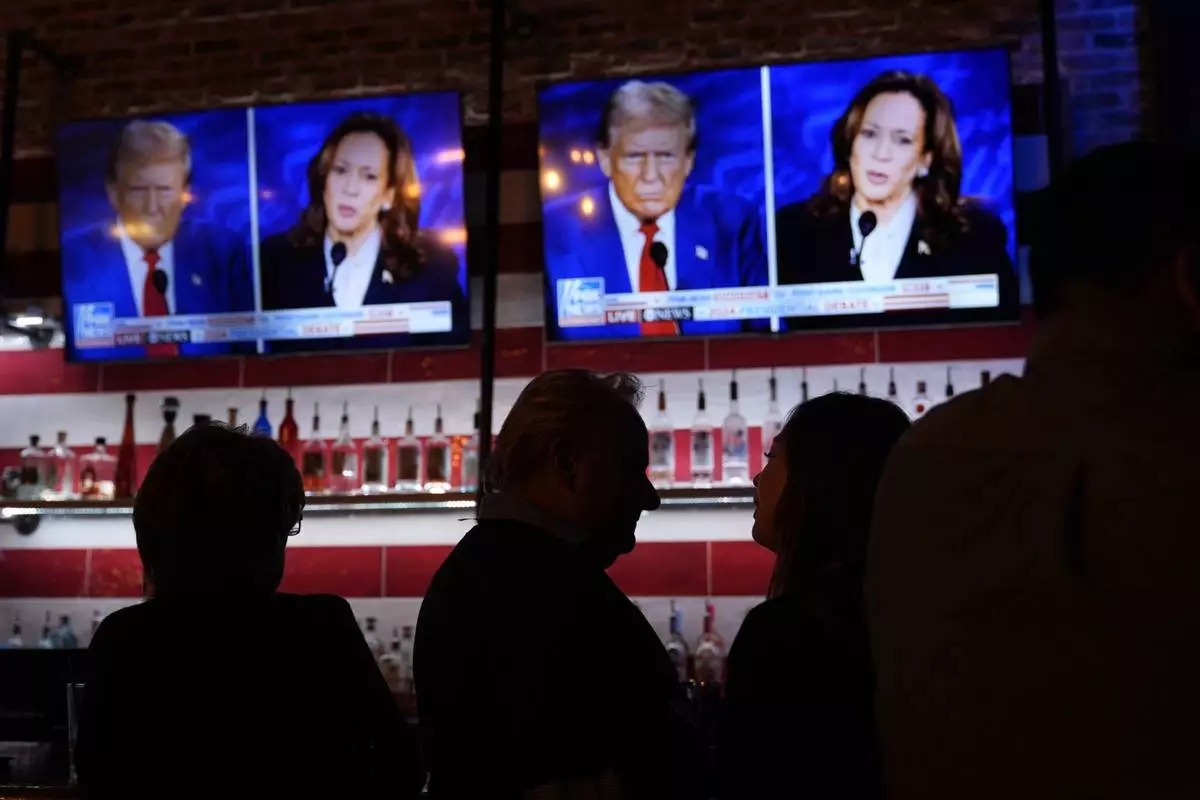
Viewers gather to watch a debate between Democratic presidential nominee Vice President Kamala Harris and Republican presidential nominee former President Donald Trump at the Angry Elephant Bar and Grill, Tuesday, Sept. 10, 2024, in San Antonio. (AP Photo/Eric Gay)
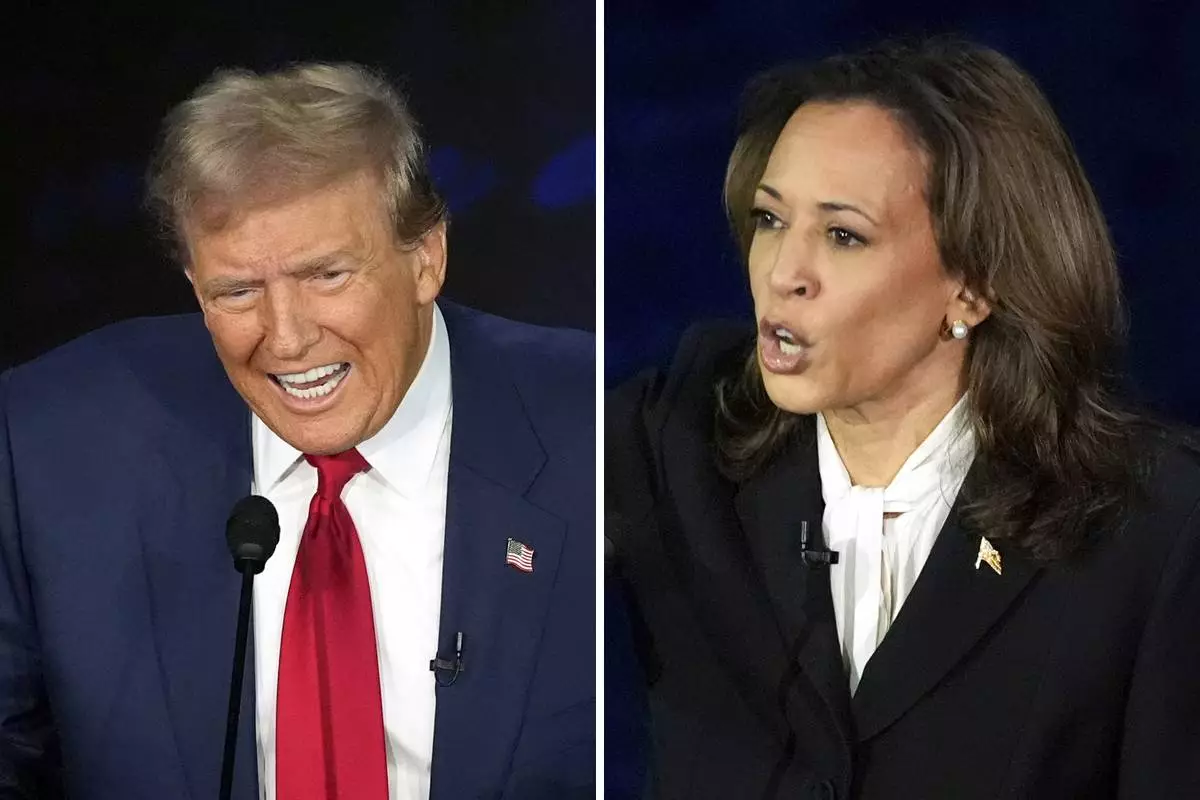
This combination of photos shows Republican presidential nominee former President Donald Trump, left, and Democratic presidential nominee Vice President Kamala Harris during an ABC News presidential debate at the National Constitution Center, Tuesday, Sept. 10, 2024, in Philadelphia. (AP Photo/Alex Brandon)
President Donald Trump moved to end a decades-old immigration policy known as birthright citizenship when he ordered the cancellation of the constitutional guarantee that U.S.-born children are citizens regardless of their parents’ status.
Trump's roughly 700-word executive order, issued late Monday, amounts to a fulfillment of something he's talked about during the presidential campaign. But whether it succeeds is far from certain as attorneys general in 18 states and two cities challenged the order in court on Tuesday, seeking to block the president.
Here's a closer look at birthright citizenship, Trump's executive order and reaction to it:
Birthright citizenship means anyone born in the U.S. is a citizen, regardless of their parents' immigration status. People, for instance, in the United States on a tourist or other visa or in the country illegally can become the parents of a citizen if their child is born here.
It's been in place for decades and enshrined in the 14th Amendment to the Constitution, supporters say. But Trump and allies dispute the reading of the amendment and say there need to be tougher standards on becoming a citizen.
The order questions that the 14th Amendment extends citizenship automatically to anyone born in the United States.
The 14th Amendment was born in the aftermath of the Civil War and ratified in 1868. It says: “All persons born or naturalized in the United States and subject to the jurisdiction thereof, are citizens of the United States and of the State wherein they reside.”
Trump's order excludes the following people from automatic citizenship: those whose mothers were not legally in the United States and whose fathers were not U.S. citizens or lawful permanent residents; people whose mothers were in the country legally but on a temporary basis and whose fathers were not citizens or legal permanent residents.
It goes on to bar federal agencies from recognizing the citizenship of people in those categories. It takes effect 30 days from Tuesday, on Feb. 19.
The 14th Amendment did not always guarantee birthright citizenship to all U.S.-born people. Congress did not authorize citizenship for all Native Americans born in the United States, for instance, until 1924.
In 1898 an important birthright citizenship case unfolded in the U.S. Supreme Court. The court held that Wong Kim Ark, who was born in San Francisco to Chinese immigrants, was a U.S. citizen because he was born in the country. After a trip abroad, he had faced denied reentry by the federal government on the grounds that he wasn't a citizen under the Chinese Exclusion Act.
But some advocates of immigration restrictions have argued that while the case clearly applied to children born to parents who are both legal immigrants, it’s less clear whether it applies to children born to parents without legal status.
Eighteen states, plus the District of Columbia and San Francisco sued in federal court to block Trump's order.
New Jersey Democratic Attorney General Matt Platkin said Tuesday the president cannot undo a right written into the Constitution with a stroke of his pen.
“Presidents have broad power but they are not kings,” Platkin said.
Not long after Trump signed the order, immigrant rights groups filed suit to stop it.
Chapters of the American Civil Liberties Union in New Hampshire, Maine and Massachusetts along with other immigrant rights advocates filed a suit in New Hampshire federal court.
The suit asks the court to find the order to be unconstitutional. It highlights the case of a woman identified as “Carmen," who is pregnant but is not a citizen. The lawsuit says she has lived in the United States for more than 15 years and has a pending visa application that could lead to permanent status. She has no other immigration status, and the father of her expected child has no immigration status either, the suit says.
“Stripping children of the ‘priceless treasure’ of citizenship is a grave injury,” the suit said. "It denies them the full membership in U.S. society to which they are entitled."
In addition to New Jersey and the two cities, California, Massachusetts, Colorado, Connecticut, Delaware, Hawaii, Maine, Maryland, Michigan, Minnesota, Nevada, New Mexico, New York, North Carolina, Rhode Island, Vermont, and Wisconsin joined the lawsuit to stop the order.
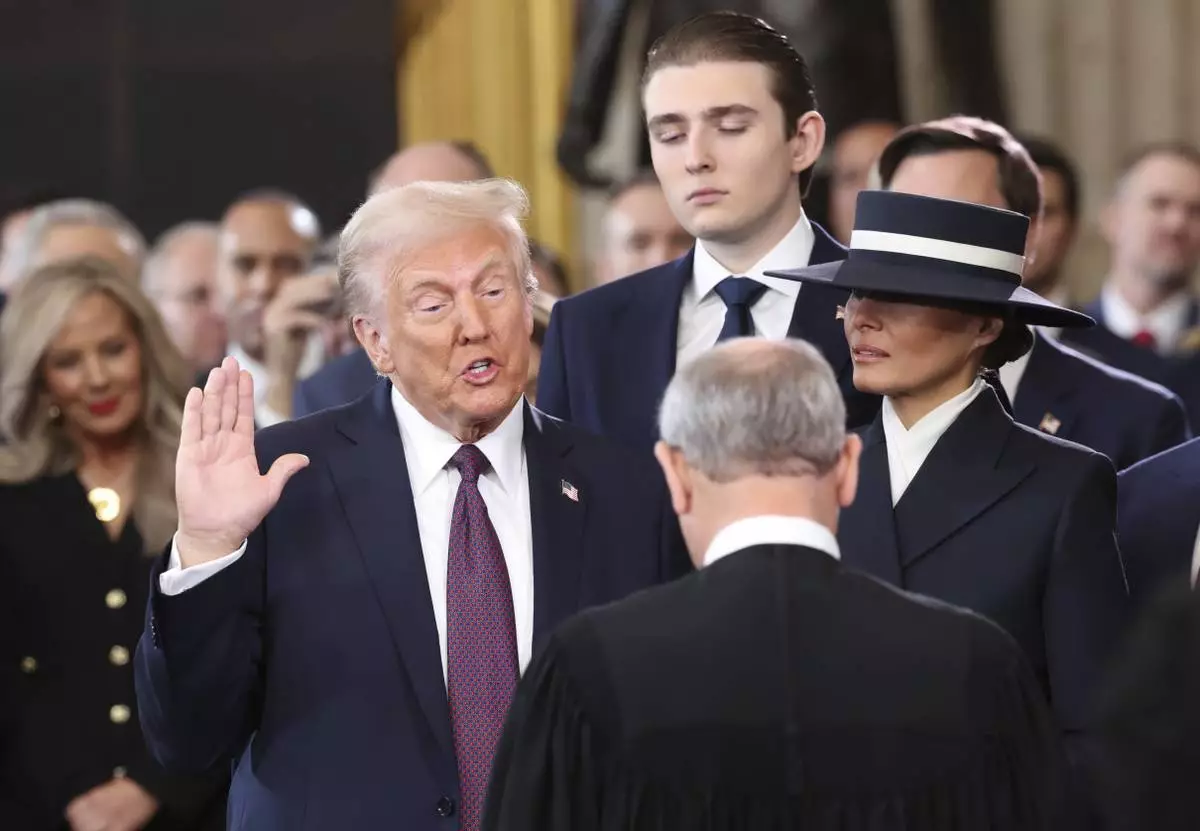
President-elect Donald Trump, from left, takes the oath of office as Barron Trump and Melania Trump watch at the 60th Presidential Inauguration in the Rotunda of the U.S. Capitol in Washington, Monday, Jan. 20, 2025. (Kevin Lamarque/Pool Photo via AP)
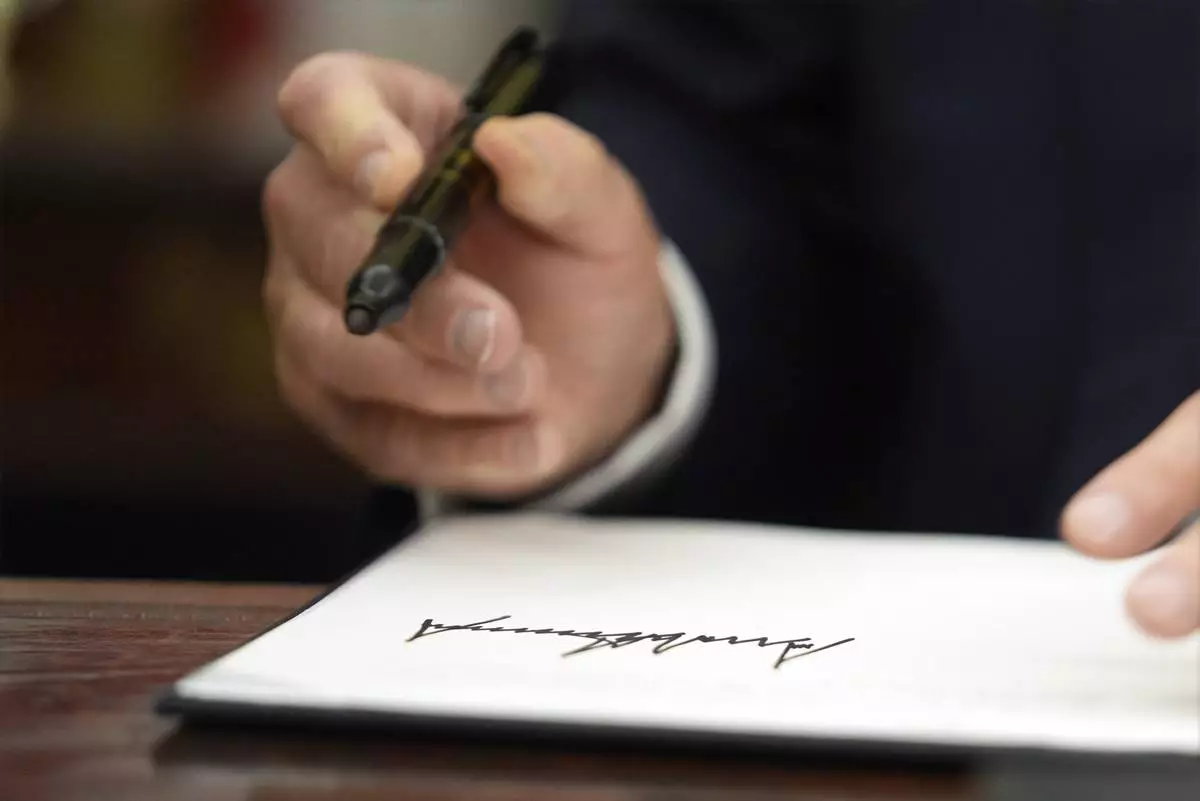
President Donald Trump signs executive orders in the Oval Office of the White House, Monday, Jan. 20, 2025, in Washington. (AP Photo/Evan Vucci)
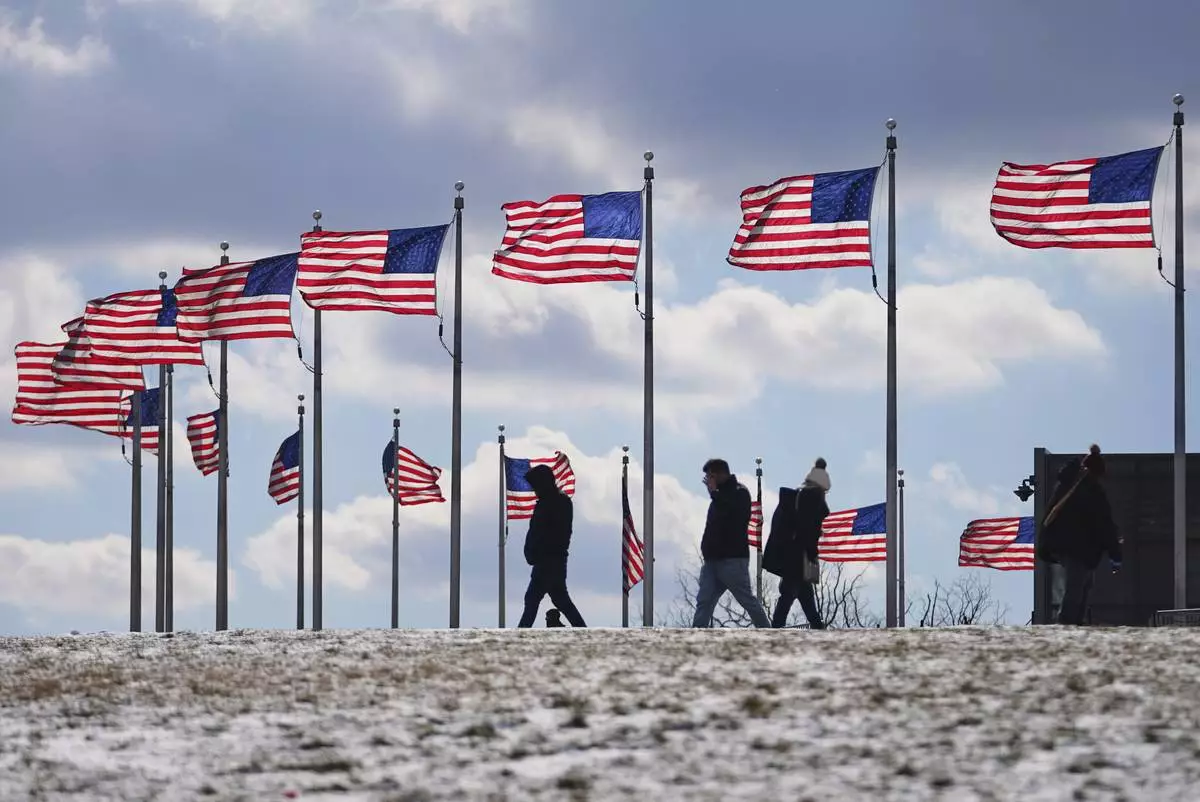
U.S. flags around the Washington Monument are at full staff during the 60th Presidential Inauguration, Monday, Jan. 20, 2025, in Washington. Flags are supposed to fly at half-staff through the end of January out of respect for former President Jimmy Carter, who died Dec. 29, 2024. (AP Photo/Julio Cortez)

A young man reacts to information on how to prepare for the upcoming changes to undocumented families living in the U.S., Sunday, Jan. 19, 2025, in Miami. (AP Photo/Marta Lavandier)
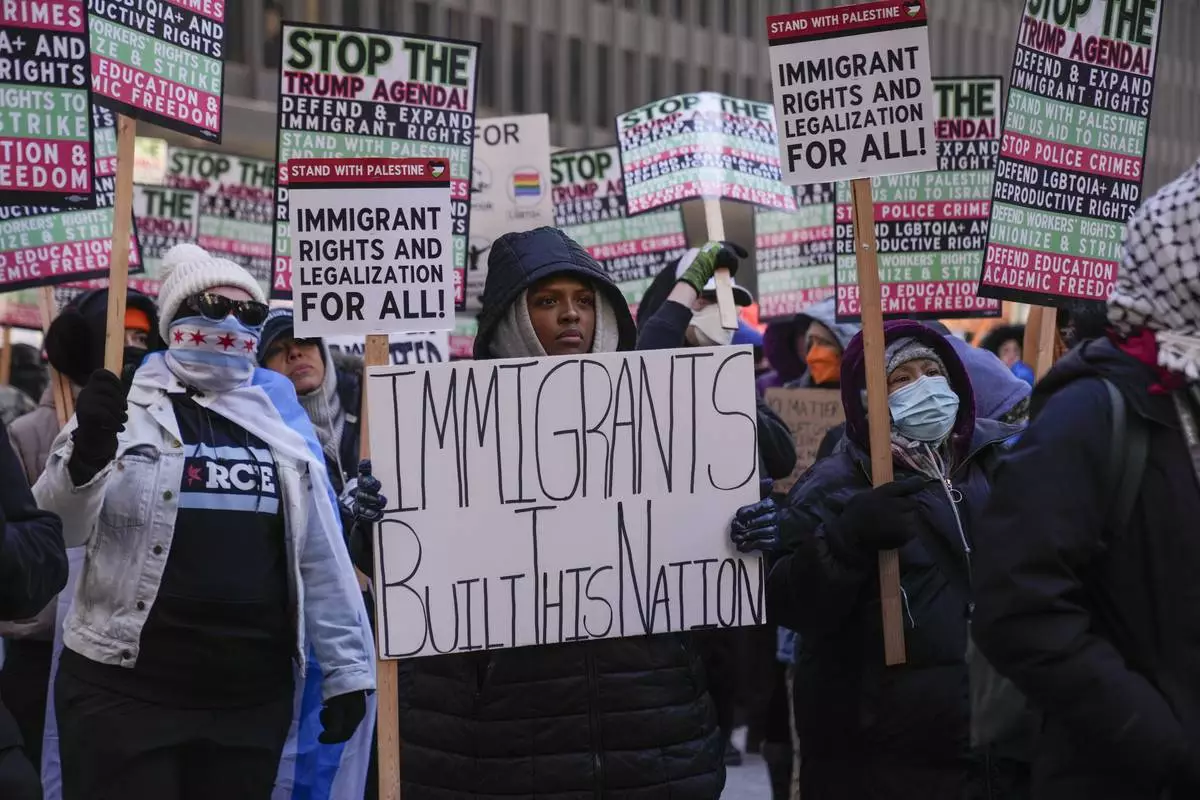
Sonia Rosa Sifore and other anti-Trump protesters gather in Federal Plaza to rally for a number of issues, including immigrant rights, the Israel-Hamas war, women's reproductive rights, racial equality and others, on the day of President Trump's Inauguration, Monday, Jan. 20, 2025, in Chicago. (AP Photo/Erin Hooley)
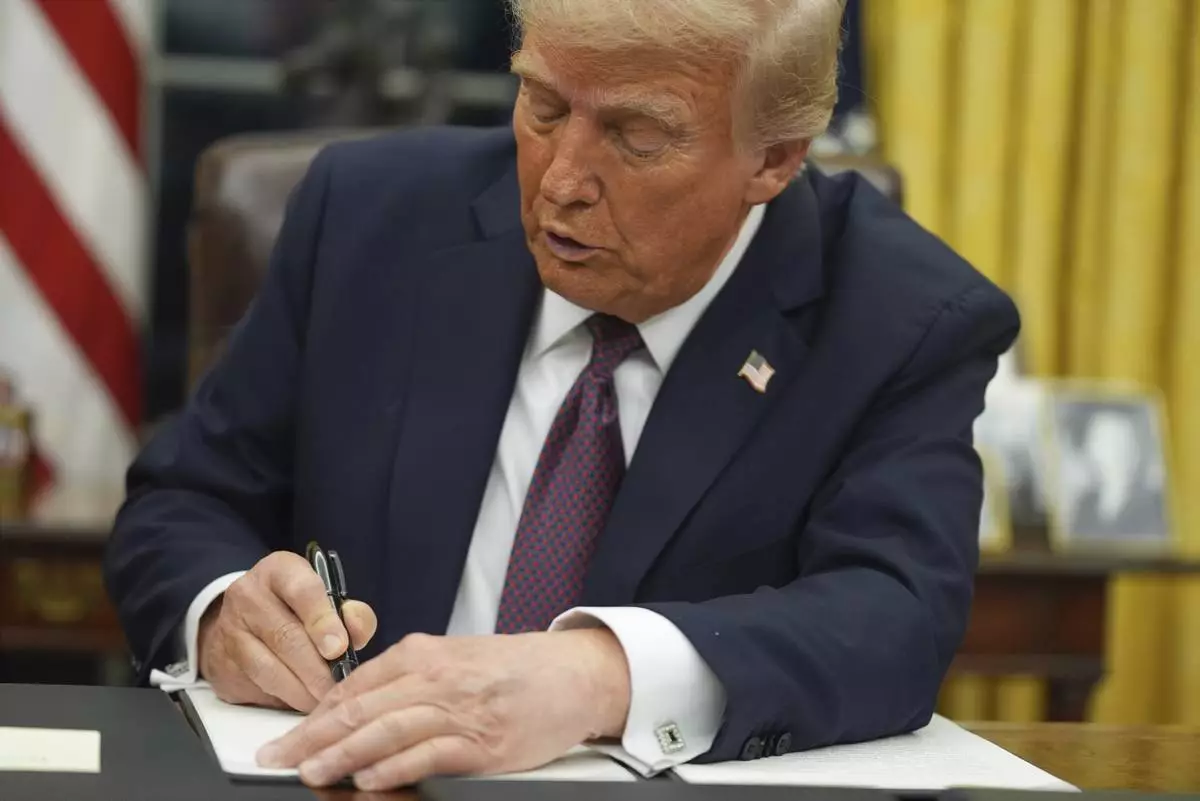
President Donald Trump signs an executive order on birthright citizenship in the Oval Office of the White House, Monday, Jan. 20, 2025, in Washington. (AP Photo/Evan Vucci)






